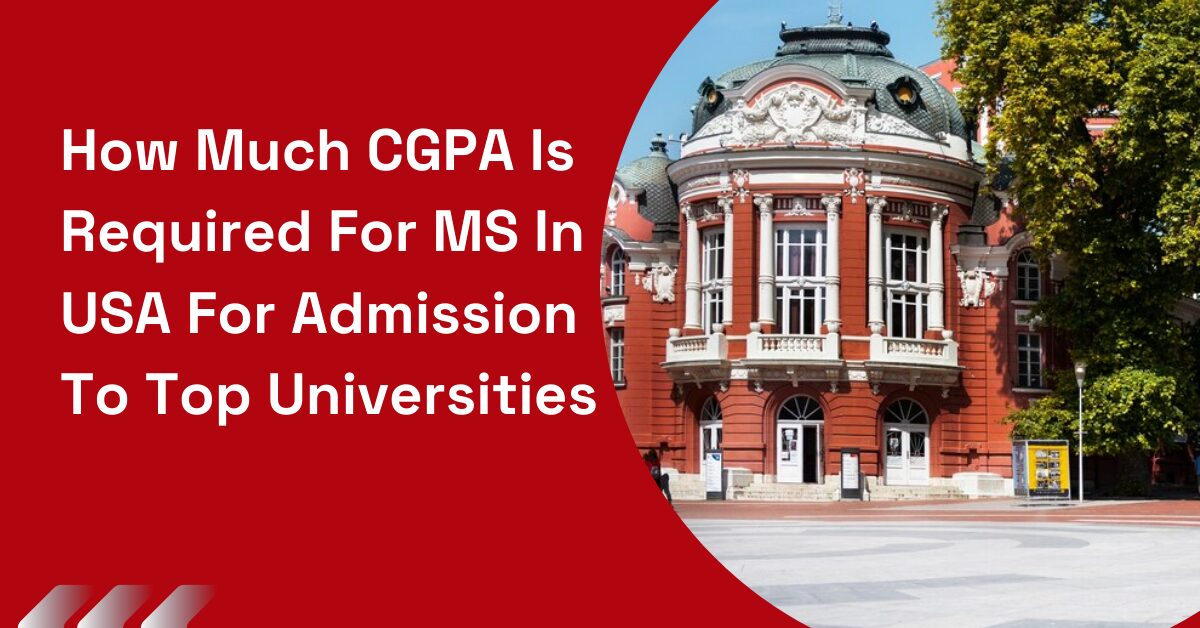17 December 2024
7 minutes read
How Much CGPA Is Required For MS In USA For Admission To Top Universities

Key Takeaways
- Most top US universities look for a minimum CGPA of 3.0-3.5 (7.5-8.5 on a 10-point scale), but your overall application matters too.
- Nail those standardized tests: aim for GRE scores above 300 and TOEFL/IELTS scores of 80-100/6.5-7.0 respectively.
- Budget wisely: annual costs can range from $30,000 to $65,000+, but scholarships are available to ease the financial burden.
- Your MS degree can open doors to lucrative careers, with many roles offering $60,000-$120,000 annually, plus work permit options.
Are you aiming for a Master’s degree in the US but unsure about the CGPA requirements for top universities? You’re not alone. Many students face the challenge of understanding how their academic performance measures up to the expectations of prestigious institutions.
Checking up the CGPA requirements can be confusing, especially with varying benchmarks set by different universities. But don’t worry, we’ve got you covered. In this blog, we’ll break down what CGPA you need to aim for to increase your chances of admission to the top MS programs in the US. Keep reading to find out how you can meet and exceed these expectations!
How Much CGPA is Required To Apply For An MS in USA
The CGPA (Cumulative Grade Point Average) specific requirement for best MS programs in the USA varies depending on the university and the specific program. Generally, most competitive universities look for a minimum CGPA of 3.0 on a 4.0 scale, which is equivalent to a B average. However, top-tier institutions and highly selective programs may have higher expectations, often preferring candidates with a CGPA of 3.5 or above.
It’s important to note that while CGPA is a significant factor in the admission process, universities also consider other aspects such as GRE scores, letters of recommendation, research experience, and statement of purpose. Some universities may accept lower CGPAs if the applicant demonstrates exceptional strengths in other areas of their application.
Here are some universities and their general CGPA requirements for MS programs in the USA:
| University | Minimum GPA (4.0 scale) | Minimum CGPA (10-point scale) |
|---|---|---|
| Stanford University | 3.5+ | 8.5+ |
| Massachusetts Institute of Technology (MIT) | 3.5+ | 8.5+ |
| University of California, Berkeley | 3.0 | 7.5 |
| Georgia Institute of Technology | 3.0 | 7.5 |
| University of Illinois Urbana-Champaign | 3.0 | 7.5 |
| Purdue University | 3.0 | 7.5 |
| Texas A&M University | 3.0 | 7.5 |
| Arizona State University | 3.0 | 7.5 |
| University of Texas at Austin | 3.0 | 7.5 |
| Ohio State University | 3.0 | 7.5 |
What Standardized Test Scores and Language Proficiency Is Required?

To gain admission to MS programs in the USA, international students typically need to demonstrate their academic aptitude and English language proficiency through standardized tests.
| Test Type | Purpose | Competitive Score Range | Additional Notes |
|---|---|---|---|
| GRE (Graduate Record Examination) | Assesses quantitative, verbal, and analytical writing skills. | Quantitative: 155-170, Verbal: 150-165, Analytical Writing: 4.0-6.0 | Most common for STEM and various other fields. |
| GMAT (Graduate Management Admission Test) | Evaluates analytical, writing, quantitative, verbal, and reading skills in standard written English. | Total: 650-750 | Primarily for business-related fields like MBA. |
| TOEFL (Test of English as a Foreign Language) | Tests English language proficiency for non-native speakers. | Total: 80-100, with no section below 20 | Widely accepted in most universities. Internet-based test. |
| IELTS (International English Language Testing System) | Assesses English listening, reading, writing, and speaking skills. | Overall: 6.5-7.5, with no band below 6.0 | Accepted by many institutions as an alternative to TOEFL. |
| PTE (Pearson Test of English) | Measures English language ability for university study. | Overall: 58-65 | Accepted by some institutions as an alternative to TOEFL and IELTS. |
What Indian Students Require for MS in the USA?
For Indian students who are pursuing MS degree in the USA, the journey is both thrilling and challenging. The United States, with its prestigious universities and cutting-edge research opportunities, remains a top destination for higher education. However, the application process for MS programs can be quite comprehensive and requires meticulous preparation.
Indian students need to navigate various requirements that not only showcase their academic abilities but also demonstrate their potential to succeed in a diverse and rigorous academic environment.
Academic Qualifications
A strong academic background is the cornerstone of a successful MS application. Indian students typically need a four-year bachelor’s degree from a recognized university in India, relevant to their intended field of study. While some US universities may accept three-year degrees, this is not universal, and additional coursework or justification may be required.
A good Grade Point Average (GPA) or Cumulative Grade Point Average (CGPA) is essential. Most of the top US universities look for a minimum GPA of 3.0 on a 4.0 scale (around 7.5 on a 10-point scale). However, top-tier institutions often prefer higher GPAs, usually 3.5 or above (equivalent to a CGPA of 8.5+).
Standardized Test Scores
Standardized tests like the Graduate Record Examination (GRE) are a significant part of the admissions process, providing a common benchmark to evaluate students from diverse educational backgrounds. Competitive GRE scores are typically around 300 and above (out of 340), with top programs often expecting scores of 320 or higher.
Some programs may have specific minimum score requirements for individual sections (Verbal, Quantitative, and Analytical Writing). For business-related programs, the Graduate Management Admission Test (GMAT) might be required instead of or in addition to the GRE. Competitive GMAT scores usually start at 650 (out of 800).
English Language Proficiency
Since English is the medium of instruction in US universities, demonstrating proficiency in the language is mandatory. The Test of English as a Foreign Language (TOEFL), the International English Language Testing System (IELTS) and CEFR are the three most widely accepted English language proficiency tests.
For the TOEFL internet-based test (Can be taken online), scores between 80 and 100 are generally competitive, with some top universities requiring 100 or above. For the IELTS, an overall band score of 6.5 to 7.0 is typical, with prestigious programs sometimes requiring 7.0 to 7.5.
Letters of Recommendation
Letters of recommendation offer insight into a student’s academic abilities, research potential, and personal qualities from the perspective of professors or professionals who have worked closely with the student. Most MS programs require two to three academic letters of recommendation.
These should ideally come from professors who have taught the student in relevant courses or supervised their projects or research. For students with work experience, a letter from a supervisor or manager can also be valuable.
Statement of Purpose and Resume
A winning Statement of Purpose (SOP) is a critical component of the application, allowing students to articulate their academic background, research interests, career goals, and reasons for choosing the specific program and university. This essay should be well-crafted, demonstrating clear writing skills and thoughtful reflection on the student’s academic journey and future aspirations.
It should highlight how the chosen program aligns with the student’s goals and what unique perspectives or experiences the student can bring to the program. Alongside the SOP, a comprehensive resume personal statement or CV is required, showcasing academic achievements, relevant coursework, projects, internships, publications (if any), and work experience.
Additional Requirements and Financial Considerations
Some programs may have additional requirements such as writing samples, portfolios (for design or art-related fields), or interviews. It’s crucial to check the specific requirements for each program of interest. Financial documentation is another important aspect of the application process.
While not directly related to academic qualifications, proof of the ability to fund studies (through bank statements, scholarship letters, or other financial documents) is required for the issuance of the I-20 form, which is necessary for obtaining an F-1 student visa. Students should also be prepared for application fees, which typically range from $50 to $150 per application.
Visa Process and Deadlines
Once accepted into a program, Indian students need to get into the student visa application process for masters in USA. This requires the acceptance letter, I-20 form, financial documents, and a visa interview at the U.S. embassy or consulate. Application deadlines vary by university and program.
For fall admissions, deadlines are usually between December and March of the preceding year, while spring admission deadlines (where available) typically fall between September and October. Planning well in advance is crucial, as gathering all necessary documents, taking required tests, and preparing a strong application can take several months.
Top US Universities and Courses for MS

| University | Popular MS Course | Course Duration | Brief Description |
|---|---|---|---|
| Massachusetts Institute of Technology (MIT) | Computer Science | 2 years | Focused on advanced computing skills and cutting-edge research. |
| Stanford University | Electrical Engineering | 1.5 to 2 years | Emphasizes innovation in electrical engineering and technology. |
| Harvard University | Data Science | 2 years | Integrates statistical methods with computer science. |
| University of California, Berkeley | Mechanical Engineering | 2 years | Offers in-depth knowledge of mechanical systems and design. |
| California Institute of Technology (Caltech) | Aerospace Engineering | 2 years | Specializes in space technology and aircraft systems. |
| University of Michigan, Ann Arbor | Business Analytics | 1 year | Combines business acumen with analytical skills. |
| Columbia University | Financial Engineering | 1.5 years | Merges finance, mathematics, and engineering principles. |
| University of Chicago | Economics | 1 to 2 years | Known for its strong theoretical and empirical approach to economics. |
| Carnegie Mellon University | Information Systems & Management | 1 to 1.5 years | Focuses on the intersection of technology, strategy, and management. |
| Cornell University | Biotechnology | 2 years | Offers a blend of biology, engineering, and technology. |
How Much Are Tuition and Living Costs In The USA?
Estimating the Cost of MS Studies in the USA
| Expense Type | Cost Range (USD) | Notes |
|---|---|---|
| Tuition Fees | $20,000 – $50,000 per year | Varies significantly based on the university and program. Private universities and specialized programs tend to be more expensive. |
| Living Expenses | $10,000 – $15,000 per year | Includes accommodation, food, transportation, and personal expenses. Costs can vary greatly depending on the location and lifestyle. |
| Health Insurance | $1,000 – $2,500 per year | Mandatory for most international students; cost varies by coverage and university. |
| Books and Supplies | $500 – $1,000 per year | Can vary based on the course requirements. E-books and rentals can reduce costs. |
| Miscellaneous | Variable | Includes leisure activities, travel, and other personal expenses. |
Exploring Scholarship Opportunities for International Students
| Scholarship Name | Support Type | Brief Description |
|---|---|---|
| Fulbright Foreign Student Program | Varied support | For students to study, research, or teach English in the USA. |
| AAUW International Fellowships | $18,000 – $30,000 | For women non-US citizens for study or research in the USA. |
| Aga Khan Foundation Scholarship | Tuition and living expenses | For students from developing countries for postgraduate studies. |
| Joint Japan/World Bank Scholarship | Comprehensive | For students from member countries to study development-related fields. |
| Stanford Reliance Dhirubhai Fellowships | Partial/full tuition | For Indian students needing financial aid at Stanford GSB. |
| University of Oregon Scholarships | Tuition waiver, partial funding | Includes ICSP scholarship with a cultural service component. |
| Harvard Boustany MBA Scholarship | Tuition, accommodation, travel | Biennial scholarship for Harvard Business School’s MBA program. |
| Rotary Peace Fellowships | Comprehensive | For studies in peace and conflict resolution. |
| The University of Minnesota Fellowship | Tuition waiver, living stipend | Various fellowships for international graduate students. |
| Chicago Booth Business Scholarships | Partial/full tuition | Several options for Booth School of Business students. |
Career Opportunities and Job Prospects Post-MS
| Job Role | Industry | Average Annual Salary (USD) | Work Permit/Visa Options |
|---|---|---|---|
| Data Scientist | Technology, Finance | $95,000 – $120,000 | OPT, H-1B Visa |
| Mechanical Engineer | Manufacturing, Automotive | $70,000 – $90,000 | OPT, H-1B Visa |
| Business Analyst | Business, Consulting | $65,000 – $85,000 | OPT, H-1B Visa |
| Research Scientist | Biotech, Pharmaceuticals | $80,000 – $110,000 | OPT, H-1B Visa |
| Software Developer | IT, Services | $75,000 – $100,000 | OPT, H-1B Visa |
| Project Manager | Construction, IT | $70,000 – $95,000 | OPT, H-1B Visa |
| Financial Analyst | Finance, Banking | $60,000 – $85,000 | OPT, H-1B Visa |
| Marketing Manager | Marketing, Advertising | $65,000 – $90,000 | OPT, H-1B Visa |
| HR Manager | Various Industries | $60,000 – $80,000 | OPT, H-1B Visa |
| Health Services Manager | Healthcare | $70,000 – $100,000 | OPT, H-1B Visa |
Conclusion
Pursuing a Master’s in the USA is an enriching journey that demands diligence, from understanding CGPA requirements to navigating admissions. A successful application hinges on showcasing a holistic profile that goes beyond minimum academic criteria.
This endeavor is not just about fulfilling educational aspirations but also about experiencing a vibrant cultural and professional landscape. As you prepare, focus on aligning your ambitions with the diverse opportunities offered by the US education system. Remember, thorough preparation and a well-rounded application are your keys to unlocking a transformative educational and personal development experience in the USA.
Seize the opportunity to study in the USA, where innovation meets tradition in education. Ambitio’s comprehensive support will guide you through selecting universities, preparing for entrance exams, and understanding the cultural landscape, ensuring a smooth transition and successful academic experience in the United States.
FAQs
What is the minimum CGPA required for MS in the USA?
The minimum CGPA required varies from university to university but generally, it’s around 3.0 on a 4.0 scale
Is a 3.0 GPA enough for MS in the USA?
A 3.0 GPA is considered good, but for top universities, a GPA of 3.5 or higher is preferable.
Are there universities that accept students with a CGPA lower than 3.0?
Yes, some universities do accept students with a CGPA lower than 3.0 if they have a strong overall profile.
What if my CGPA is low?
Having a low CGPA isn’t the end of the road. Focus on improving other aspects of your profile like GRE score, SOP, LORs, and internships.
What’s the role of the GRE in MS admissions in the USA?
GRE scores are a crucial part of your application. A strong GRE score can compensate for a low CGPA to some extent.

You can study at top universities worldwide!
Get expert tips and tricks to get into top universities with a free expert session.
Book Your Free 30-Minute Session Now! Book a call now




























